How To Build Social Skills In Preschool Toddlers
In the following, we’ll be discussing a vital topic that’s “How to build social skills in preschool toddlers” let’s discuss it thoroughly within the article.
Many people assume that children ought to spend lots of time with same-aged peers to develop social skills. They don’t. Play-dates and preschool attendance can enrich your child’s life. But socialization–the process of learning how to get along with others–is not the same thing as socializing.
Preschool social skills depend on several abilities:
- self-control
- empathy
- verbal communication
Spending the day with same-aged peers isn’t necessarily a great way for young children to learn about cooperation, sharing, and emotional self-control.
In fact, the opposite might be true. Too much time with peers might make kids behave badly. In studies of American preschoolers, the more time preschoolers spent in center-based care, the more likely they were to develop externalizing behavior problems. We shouldn’t assume it’s inevitable, because some child care arrangements are associated with little or no risk of increased behavior problems. For details, see this article on the consequences of peers on preschool social skills.
But the widespread links between center-based care and behavior problems are at odds with the idea that youngsters need peers to acquire good social skills. On the contrary, when it actually comes to learning positive social skills, behaviors such as offering help, cooperation, showing sympathy, making amends, understanding other perspectives, extending forgiveness as well as observing social etiquette the best tutors are older children and also adults. Regarding this,child specialist in west delhi are providing a best services.
1. Maintain A Loving And Secure Relationship With Your Toddler
When parents show themselves to be caring and dependable — sensitive and responsive to their children’s needs — children are more likely to develop secure attachment relationships. And children who are securely attached are more likely to show social competence For instance:
- Preschoolers with secure attachments at ages 2 and 3 have demonstrated greater ability to solve social problems and less evidence of loneliness.
- Young children with secure attachments are more likely to show empathy and come to the aid of people in distress.
- Preschoolers with more secure attachments are more likely to share, and more likely to show generosity towards individuals they don’t like.
Why are secure attachments connected with social competence? You might wonder if it merely “runs in the family.” Maybe the same genetic tendencies that foster secure attachments also make children more likely to develop good social skills. That probably accounts for some of the associations. But the environment still plays a crucial role in the story. Genes don’t program traits by themselves. They respond to environmental inputs.
For instance, we all know that young children develop differently depending on the threats they perceive. They tend to show less prosocial behavior — like kindness and generosity — when they feel worried or anxious. So it’s likely that secure attachments (including secure attachments to teachers and other individuals) can boost prosocial behavior by making children feel less stressed and more confident. And some toddlers may possess genes that make them particularly sensitive to these effects.
2. Be Your Child’s “Emotion Coach”
Emotional competence is actually the key to strong preschool social skills. The better children understand emotions, the more they’re liked by peers. Shy children are at greater risk of being rejected by peers, but when shy children possess a well-developed ability to recognize emotions, this risk is much reduced. You can help children learn about emotions by engaging them in conversation. Discuss what sorts of situations make us feel bad, and what things make us feel good. When adults explain emotions and their causes — and share constructive suggestions for coping with negative feelings — kids learn how to better regulate themselves.
In one study, parents who used “more frequent, more sophisticated” language about emotions had kids who could better deal with anger and disappointment. In another, parents who were particularly encouraged to coach their toddlers were rewarded with improvements in behavior. Preschoolers were better able to handle their frustration.
3. Be Calm As Well As Supportive
This goes hand in hand with being your toddler’s emotion coach. When a toddler launches into a seemingly irrational crying jag, it’s natural to want to shut him up. But simply telling a toddler to be quiet doesn’t help him learn. Research also suggests that toddlers are much more likely to develop social-emotional competence if we simply acknowledge bad feelings as well as show them better ways to resolve their problems.
In a study tracking toddlers for twelve months, parents who took this approach were more likely to finish up with highly prosocial children. This was true even after researchers adjusted for a child’s initial tendencies to become distressed and engage in prosocial acts. Other studies or researches indicate that young children who actually receive emotional support are less likely to direct negative emotions at peers. They are also better liked by peers, and rated as more socially-competent by teachers.
Finally, research or studies report links between preschool social competence and a toddler’s perceptions of his/her parent’s emotional availability. In one study, preschoolers were asked to predict how their parents would answer them in various situations. Children who predicted that their parents would offer reassurance and comfort were rated by teachers as more skilled with peers, more empathic, and more cooperative.
4. Practice Inductive Discipline
Across the globe, many parents use inductive discipline to instill preschool social skills. This is the practice of explaining the reasons for rules and talking — calming and sensitively — to children once they misbehave. Inductive discipline is one among the key components of authoritative parenting, a style of child-rearing related to the best-behaved kids. And there’s evidence that this “teaching through conversation” approach to discipline helps children become more conscientious and prosocial.
For example, in a study that tracked approximately 300 preschoolers over the course of three years, researchers found that children were more prosocial if their mothers used inductive discipline. An earlier study found that the preschool children of inductive mothers were more prosocial and less likely to engage in disruptive, anti-social behavior. They were also more popular with peers. And research suggests that children exposed to inductive discipline are less likely to develop aggressive behavior problems.
5. Inspire Children With Positive Words
Young children thrive on praise, particularly once we praise their good choices and actions. What about criticism? Here we must tread carefully, as toddlers can get the impression that we view them as inherently disappointing or bad. And that perception undermines their motivation to improve. What works best is a constructive approach, challenging children to think of ways they could do better.
And it seems likely we will foster preschool social skills by giving children opportunities to feel the pleasant rush of being a helper or giver. Many young children understand that being generous feels good, but, like adults, they may need a reminder. If we present kids with opportunities to assist — and call their attention to the happiness their good deeds cause — we will increase their interest in giving.
We can also encourage kindness by simply arranging for children to engage in reciprocal play — the kind that involves taking turns. In experiments, simply rolling a ball back and forth made preschoolers show much more generosity toward a playmate. This single act of reciprocity was enough to trigger altruism.

